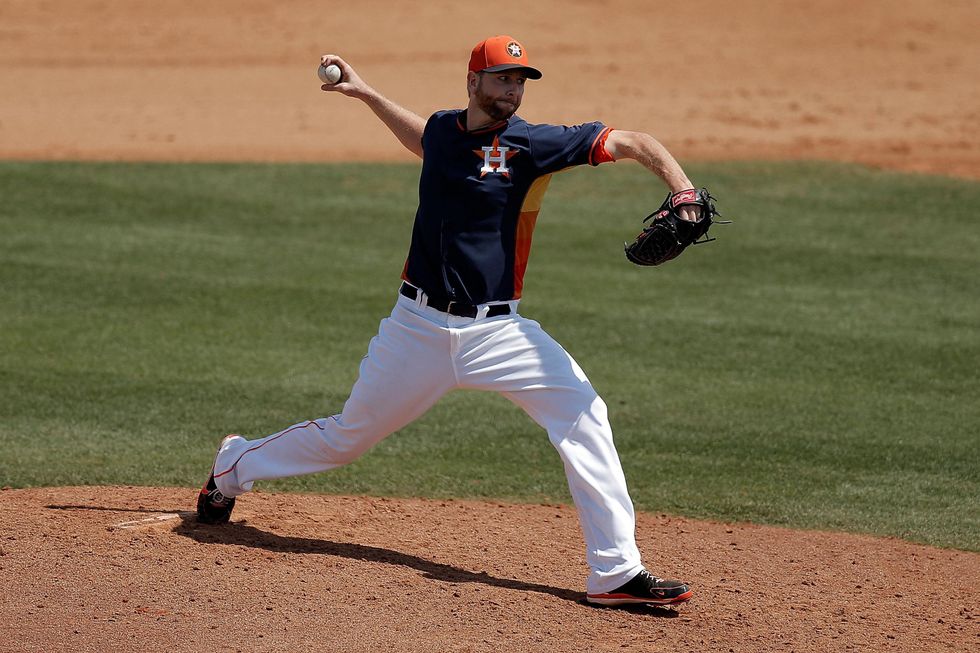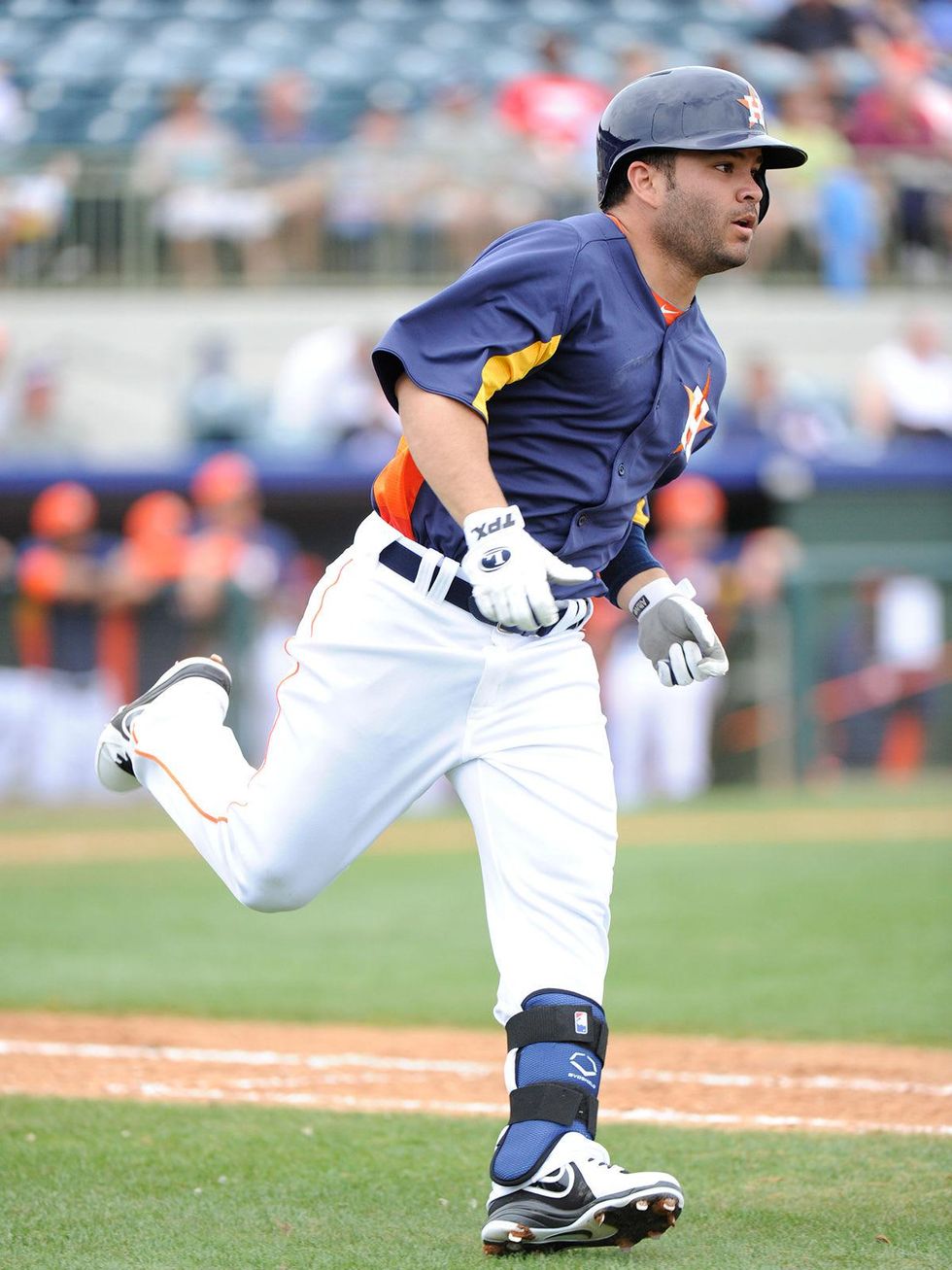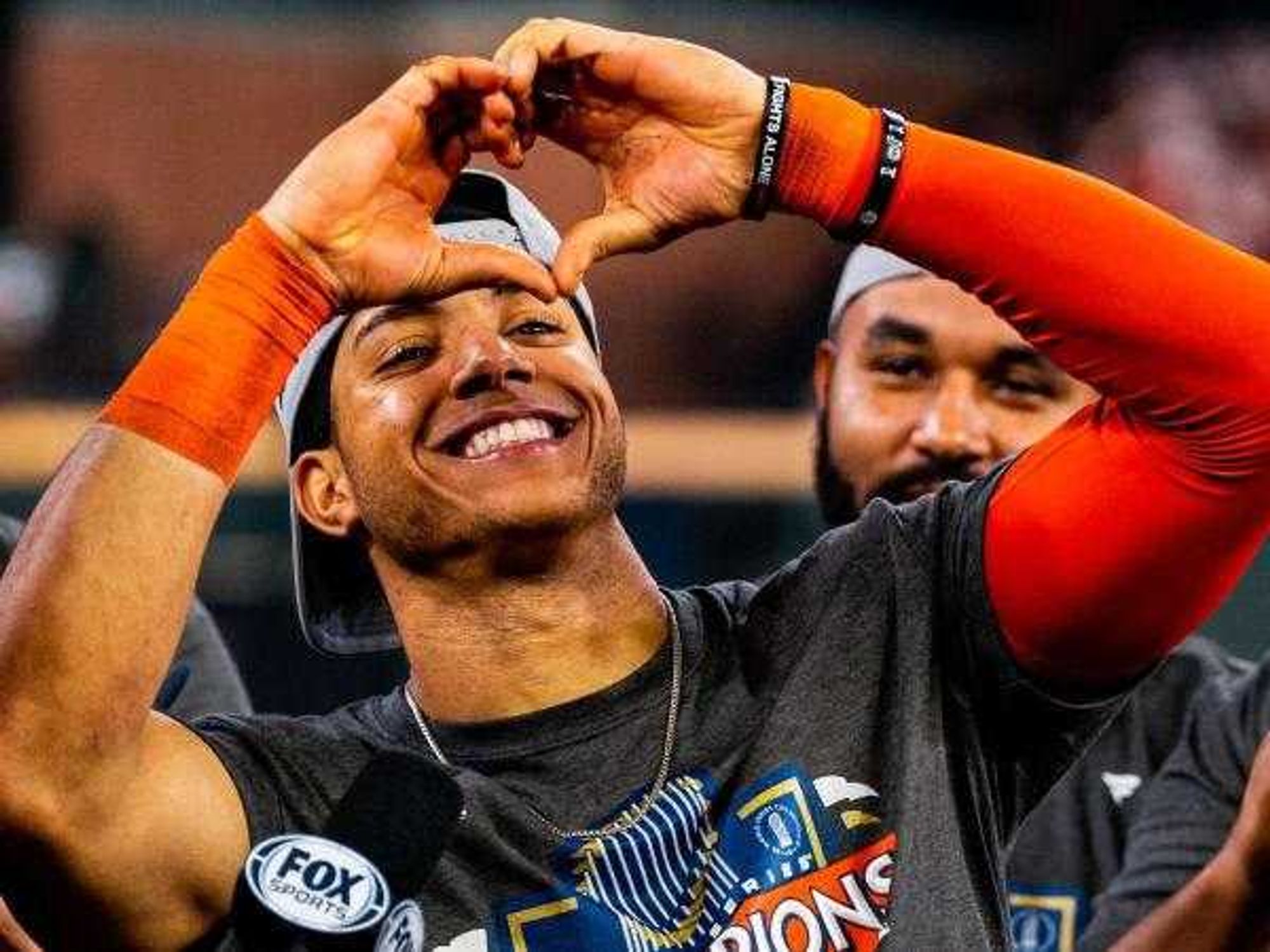Hardball
Same old Astros? It's hard to find hope and change in this Yankees-fighting, Opening Day lineup
The blunt force of reality struck with impunity and without remorse: Following an offseason of incremental moves designed to improve the major league product, the Houston Astros will instead feature a lineup and rotation primarily comprised of the same players who authored a miserable 111-loss campaign in 2013.
The Astros have ostensibly etched in marker their opening day roster. For fans of the beleaguered organization, all desires for an influx of potential were defused when the club reassigned/optioned six of its most ballyhooed prospects on March 20: Mark Appel, Carlos Correa, Delino DeShields Jr., Mike Foltynewicz, Jon Singleton and George Springer.
Along with that sextet went all rational hope that the Astros would commence the 2014 season against the New York Yankees on Tuesday night resembling something other than a roster which closed last season with 15 consecutive losses.
There are several new faces, of course: pitchers Scott Feldman, Jerome Williams, Matt Albers, Anthony Bass and Chad Qualls earned paychecks with other organizations last season, as did center fielder Dexter Fowler, first baseman/outfielder Jesus Guzman and recent waiver wire outfield pickup Alex Presley. But as many as four of those five pitchers could open the season in the bullpen (depending upon what role Williams secures), and Guzman has been just poor enough this spring (.188/.333/.344 in 39 plate appearances through March 25) that there is a strong possibility Marc Krauss gets the start against the Yankees.
When the Astros take the field at Minute Maid Park on Opening Day, Feldman and Fowler could be the lone newcomers in play. So much for abundant hope and change.
Fowler represents a significant upgrade over what the Astros had masquerading in center last season. His ZiPS projections (.247/.354/.382 with 12 home runs and 38 RBIs) are a definitive improvement compared to the 654 combined plate appearances of Brandon Barnes, Robbie Grossman, Justin Maxwell, Trevor Crowe, L.J. Hoes and Jake Elmore that produced a .218/.270/.314 slash line with eight homers and 48 RBIs.
His projected 2.3 WAR is more than double what Barnes delivered in 445 plate appearances, and if Fowler can match what Barnes offered defensively in center, the Astros will be ecstatic.
When the Astros take the field at Minute Maid Park on Opening Day, Feldman and Fowler could be the lone newcomers in play.
What the Astros mine from the potential Guzman/Krauss platoon at first base will be critical to the overall health of their offense. Astros first basemen produced a .224/.316/.423 slash line with 29 homers and 74 RBIs over 657 plate appearances last season, with Chris Carter responsible for a third of that production when he posted a .225/.332/.429 line with 10 homers and 26 RBIs at first. In theory, the Astros have made enough moves to keep Carter where he belongs defensively — as their full-time designated hitter. Whether Guzman/Krauss can produce as a placeholder until Singleton arrives is the key query.
If Guzman (.249/.318/.416) and Krauss (.213/.298/.369) can combine for 27 homers and 107 RBIs as ZiPS projects, the Astros will gladly accept their meager OPS production. But there are concerns that neither can match those totals, with rumors rampant that the club is in the market for a first baseman.
Beyond the changes at first and in center, the Astros are banking on the development and maturation of their returning position players. That rings especially true in left field, right field and at shortstop, where Grossman, Hoes and Jonathan Villar appear set for significant increases in plate appearances.
While the ZiPS projections for second baseman Jose Altuve (.285/.323/.384), catcher Jason Castro (.256/.337/.439 with 14 homers and 50 RBIs), third baseman Matt Dominguez (.249/.294/.395 with 17 homers and 74 RBIs) and Carter (.228/.319/.461 with 28 homers and 79 RBIs) reveal modest improvement and/or stability, Grossman, Hoes and Villar represent wild cards near the bottom of the batting order. Combined that trio recorded 710 plate appearances and a -0.3 WAR last season, their impact limited by midseason acquisition (Hoes), midseason promotion (Villar), or toggling between Oklahoma City and Houston (Grossman).
The Astros expect all three to contribute to varying degrees this season (although the corner outfielders are sure to be impacted by the eventual promotion of Springer), and how quickly they settle in as lineup fixtures could dictate the advancement made offensively.
What is clear at this stage is the Astros' pitching prospects appear to be farther down a distant horizon.
ZiPS projects Grossman (.228/.321/.330), Hoes (.271/.337/.366) and Villar (.235/.295/.356) to combine for 1.7 WAR, 24 homers and 135 RBIs (over 1,791 plate appearances), ambitious totals for youngsters still finding their way. Sometime in 2015 the Astros might have three new faces in the slots Grossman, Hoes and Villar will occupy this season, with DeShields (or, more likely, Domingo Santana), Springer and Correra entrenched as core pieces.
In the interim, opportunity knocks for this trio to make strides to not only bolster the offense, but to ward off future decisions that render them obsolete.
Where's The Ace?
Speaking of placeholders, the Astros feature plenty in their rotation. Although Feldman (ZiPS: 8-9 with a 4.57 FIP and 128.1 IP) will earn roughly one quarter of the club payroll, it's difficult to imagine his being a central figure when the Astros complete the final step from rebuilding to contention. Jarred Cosart (6-7, 4.80 FIP, 132 IP) is sure to be around, but the likes of Brett Oberholtzer (7-13, 5.55 FIP, 141.2 IP), Brad Peacock (7-12, 5.33 FIP, 137 IP) and Dallas Keuchel (7-11, 4.79 FIP, 156 IP) might ultimately cede rotation slots to Appel, Foltynewicz, Lance McCullers, Vincent Velasquez or the top overall pick in this June's draft.
What is clear at this stage is the Astros' pitching prospects appear to be farther down a distant horizon.
The state of the Astros' starting pitching remains a grave concern. Feldman, the presumptive ace, has never logged 200 innings in a season and last year was only his second even approaching that total (Feldman worked 181.2 innings between the Orioles and Cubs). Cosart and Oberholtzer enjoyed rousing second halves but are due for mean regression. Keuchel, Peacock and Williams are undistinguished pieces in a reorganization of the organizational puzzle.
Depending upon a revamped bullpen, even one as reputedly solid as this one, to stave off the specter of another 100-loss campaign might be folly. For the Astros, convincing their fan base that 90-something losses is something palatable could be the greatest challenge in advance of the opening pitch of 2014.


